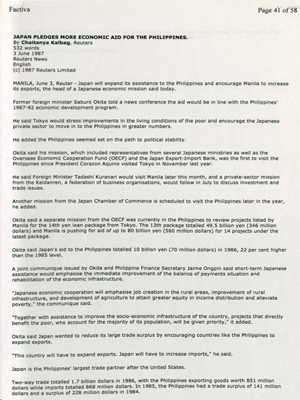JAPAN PLEDGES MORE ECONOMIC AID FOR THE PHILIPPINES
[Reuters]
Published date: 3rd Jun 1987
3 June 1987
Reuters News English
(c) 1987 Reuters Limited
MANILA, June 3, Reuter – Japan will expand its assistance to the Philippines and encourage Manila to increase its exports, the head of a Japanese economic mission said today.
Former foreign minister Saburo Okita told a news conference the aid would be in line with the Philippines’ 1987-92 economic development program.
He said Tokyo would stress improvements in the living conditions of the poor and encourage the Japanese private sector to move in to the Philippines in greater numbers.
He added the Philippines seemed set on the path to political stability.
Okita said his mission, which included representatives from several Japanese ministries as well as the Overseas Economic Cooperation Fund (OECF) and the Japan Export-Import Bank, was the first to visit the Philippines since President Corazon Aquino visited Tokyo in November last year.
He said Foreign Minister Tadashi Kuranari would visit Manila later this month, and a private-sector mission from the Keidanren, a federation of business organisations, would follow in July to discuss investment and trade issues.
Another mission from the Japan Chamber of Commerce is scheduled to visit the Philippines later in the year, he added.
Okita said a separate mission from the OECF was currently in the Philippines to review projects listed by Manila for the 14th yen loan package from Tokyo. The 13th package totalled 49.5 billion yen (346 million dollars) and Manila is pushing for aid of up to 80 billion yen (560 million dollars) for 14 projects under the latest package.
Okita said Japan‘s aid to the Philippines totalled 10 billion yen (70 million dollars) in 1986, 22 per cent higher than the 1985 level.
A joint communique issued by Okita and Philippine Finance Secretary Jaime Ongpin said short-term Japanese assistance would emphasise the immediate improvement of the balance of payments situation and rehabilitation of the economic infrastructure.
“Japanese economic cooperation will emphasise job creation in the rural areas, improvement of rural infrastructure, and development of agriculture to attain greater equity in income distribution and alleviate poverty,” the communique said.
“Together with assistance to improve the socio-economic infrastructure of the country, projects that directly benefit the poor, who account for the majority of its population, will be given priority,” it added.
Okita said Japan wanted to reduce its large trade surplus by encouraging countries like the Philippines to expand exports.
“This country will have to expand exports. Japan will have to increase imports,” he said. Japan is the Philippines’ largest trade partner alter the United States.
Two-way trade totalled 1.7 billion dollars in 1986, with the Philippines exporting goods worth 851 milli n dollars while imports totalled 868 million dollars. In 1985, the Phll1pp1nes had a trade surplus of 141 m1ll1on dollars and a surplus of 228 million dollars in 1984.
Last month, the OECF approved a 40.4 billion yen (280 million dollars) loan for a coal-fired thermal plant in south of Manila.
In April, Ongpin signed a protocol with the Export-Import Bank for a 300 million dollar loan to match a 300 million dollar economic recovery loan approved by the World Bank in March.






